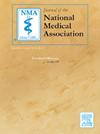Educating Physicians about Respect and Medical Distrust: Focus Groups Outcome
IF 2.3
4区 医学
Q1 MEDICINE, GENERAL & INTERNAL
引用次数: 0
Abstract
Introduction
Colorectal cancer causes significant morbidity and mortality in the United States. African-Americans have among the highest incidence and death rates in the nation. Screening for colorectal cancer improves outcomes. Multiple barriers, including perceived cost, inconvenience, transportation and fear, have been recognized to decrease adherence to screening recommendations. This study used a bi-directional learning focus group involving African-American adults and early career physicians to assess colorectal cancer screening barriers with attention to potential sociocultural concerns.
Methods
A bi-directional learning focus group of African American adults from a community church and early career physicians was conducted with a trained facilitator. An audio recording was transcribed verbatim with subsequent thematic analysis by two investigators using an iterative process. A post-focus group survey was conducted to confirm identified focus group themes with specific attention devoted to identifying potential sociocultural concerns. Analysis of pre- and post-focus group surveys was performed using Fisher Exact test with significance set a p<0.05. A second bidirectional learning focus group was conducted to review the results and to assess understanding of themes identified during the initial focus group.
Results
The focus group consisted of 18 members (7 African-American adults, 11 non-African-American early career physicians). 100% of participants recognized that there are recommended guidelines for colorectal cancer screening. The focus group identified lack of awareness (81%), colonoscopy preparation (80%), physician trust (60%), lack of insurance coverage (56%), transportation (56%), extended colonoscopy wait time (50%), insufficient physician discussion (50%) and fear of the procedure or cancer (35%) as screening barriers. However, community members more often than early career physicians identified historical racial disparity in health care (p=0.0474), physician respect toward patients (p=0.0128) and insufficient physician discussion (p=0.0006) as screening barriers.
Post-focus group surveys highlighted the desire for physicians to recognize the impact of historical racial disparities in health care delivery. While specific discussion about disparities was not desired, emphasis on communication, listening and shared decision- making was recommended. Factors which community members identified as demonstrating respect included providing adequate time for the appointment, listening with reciprocal communication, sitting and eye-contact during discussions, using titles or honorifics during initial meeting and performing physical examination as appropriate. While community and early career physicians appreciated that discussions about medical recommendations are necessary, there was a significant disparity in the perceived adequacy of physician-patient discussion. The second focus group discussion reviewed the results of the initial focus group, resulting in a mutual understanding of colorectal cancer screening barriers, including potential sociocultural concerns.
Conclusion
Colorectal cancer has a significant impact upon African-Americans. Bidirectional learning focus groups are a unique tool that can result in enhanced recognition of potential barriers to medical care. This study demonstrated that early career physicians learned from community members concerns about adherence to colorectal cancer screening that were previously not identified. This learning process can allow for implementation of specific practice strategies that can optimize care.
教育医生关于尊重和医疗不信任:焦点小组的结果
在美国,结直肠癌的发病率和死亡率都很高。非裔美国人的发病率和死亡率在全国是最高的。结直肠癌筛查可改善预后。人们已经认识到,成本、不便、交通和恐惧等多重障碍会降低对筛查建议的依从性。本研究采用双向学习焦点小组,包括非裔美国成年人和早期职业医生,以评估结直肠癌筛查障碍,并关注潜在的社会文化问题。方法在训练有素的引导者指导下,对来自社区教会的非裔美国成年人和早期职业医生进行双向学习焦点小组。录音逐字逐句转录,随后由两名调查人员使用迭代过程进行专题分析。进行了焦点小组后调查,以确认确定的焦点小组主题,并特别注意确定潜在的社会文化问题。焦点小组调查前后的分析采用Fisher精确检验,显著性设为p<;0.05。进行了第二次双向学习焦点小组,以审查结果并评估对最初焦点小组期间确定的主题的理解。结果焦点小组包括18名成员(7名非洲裔美国成年人,11名非非洲裔美国早期职业医生)。100%的参与者认识到有推荐的结直肠癌筛查指南。焦点小组认为缺乏意识(81%)、结肠镜检查准备(80%)、医生信任(60%)、缺乏保险覆盖(56%)、交通(56%)、结肠镜检查等待时间延长(50%)、医生讨论不足(50%)和对手术或癌症的恐惧(35%)是筛查障碍。然而,社区成员比早期职业医生更多地认为医疗保健中的历史种族差异(p=0.0474)、医生对患者的尊重(p=0.0128)和医生讨论不足(p=0.0006)是筛查障碍。焦点小组调查后强调,希望医生认识到历史上种族差异对医疗保健服务的影响。虽然不希望对差异进行具体讨论,但建议强调沟通、倾听和共同决策。社区成员认为表现出尊重的因素包括为预约提供足够的时间,以相互交流的方式倾听,在讨论时坐着和眼神交流,在初次会面时使用头衔或敬语,以及在适当的时候进行身体检查。虽然社区和早期职业医生认识到关于医疗建议的讨论是必要的,但在认为医患讨论是否充分方面存在很大差异。第二次焦点小组讨论回顾了第一次焦点小组讨论的结果,导致对结直肠癌筛查障碍的相互理解,包括潜在的社会文化问题。结论结直肠癌对非裔美国人有显著影响。双向学习焦点小组是一种独特的工具,可以增强对医疗保健潜在障碍的认识。这项研究表明,早期职业医生从社区成员那里了解到以前没有发现的结肠直肠癌筛查的依从性。这个学习过程可以允许实施特定的实践策略,可以优化护理。
本文章由计算机程序翻译,如有差异,请以英文原文为准。
求助全文
约1分钟内获得全文
求助全文
来源期刊
CiteScore
4.80
自引率
3.00%
发文量
139
审稿时长
98 days
期刊介绍:
Journal of the National Medical Association, the official journal of the National Medical Association, is a peer-reviewed publication whose purpose is to address medical care disparities of persons of African descent.
The Journal of the National Medical Association is focused on specialized clinical research activities related to the health problems of African Americans and other minority groups. Special emphasis is placed on the application of medical science to improve the healthcare of underserved populations both in the United States and abroad. The Journal has the following objectives: (1) to expand the base of original peer-reviewed literature and the quality of that research on the topic of minority health; (2) to provide greater dissemination of this research; (3) to offer appropriate and timely recognition of the significant contributions of physicians who serve these populations; and (4) to promote engagement by member and non-member physicians in the overall goals and objectives of the National Medical Association.

 求助内容:
求助内容: 应助结果提醒方式:
应助结果提醒方式:


